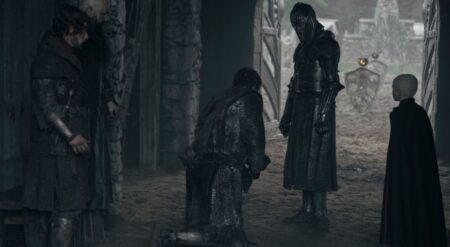Directed by Jang Young-Woo and Kim Hee-Won, and written by Park Ji-Eun, Queen of Tears (Nun-mul-eui Yeo-wang) is Netflix’s latest simulcast with tvN. The series began as a look at what happens after the traditional Kdrama rom-com. Starting with two people from opposite classes already married, the audience enters a dying marriage. Once deeply in love, Baek Hyun-woo and Hong Hae-in have been married for three years, and now, they’re coming apart at the seams.
Hyun-Woo is the legal director for the conglomerate Queens Group and the most successful person from his hometown village of Yongdu-ri. Hae-in, on the other hand, is the daughter of the family that owns and operates Queens Group and is known as the “Arrogant Queen” at Queens Department Store. The family is one of the strongest and most affluent in Korea.
They married for love, defying their parents, but love doesn’t stay strong if you don’t fight for each other. But with Hyun-woo set on divorcing his wife, she gets a life-changing diagnosis. She has three years to live. Instead of serving her the divorce papers, Hyun-woo decides to ride out the remaining months, only for the two to fall in love again.
But this is only part of the series. As Hyun-woo and Hae-in rebuild their marriage, sometimes unintentionally, Hae-in’s chaebol family is launched into intrigue. The Chairman (Kim Kap-Soo), her grandfather, takes ill. His domestic partner plots, a mysterious man from Hae-in’s past named Yoon Eun-sung (Park Sung-Hoon) swoops in, and the tension rises. The series is able to meld together romance, comedy, political maneuvering, a thrilling and tense fight for Hae-in’s heart, and so much more.
The Queen of Tears is almost indescribable in its melodramatic turns.

Summing up the series is difficult because of the narrative’s sheer number of turns. At around an hour and 25 minutes per episode, Queen of Tears is big. Every episode is large—and not just in length. Each episode aims to be bigger than the last, with more and more emotional swings, and in the back third of the season, the melodrama ramps up. However, even as this happens, the series never loses its focus on Hae-in and Hyun-woo.
It is always their story, even as the political maneuvering as Yoon Eun-sung and Moh Seul-Hee (Lee Mi-Sook) aim to take over Queens and destroy the Hong family. Even in those large moments of intrigue, their chemistry pushes past it all. But as much as that’s because of how well they work together, the couple succeeds because of how the characters develop individually. They come into their own wants and needs, and where they meet is where the magic of Queen of Tears happens.
For Hyun-woo, his sensitive nature is his strength. It’s what endears the audience to him when he’s ready to divorce Hae-in the beginning of Queen of Tears, it’s what makes him strong in the last episodes. We initially feel for him and how he’s been thrown around by the Hong family. He’s abused by them and used by the company. But when Hae-in gets her prognosis and starts to fight back against her overbearing family, Hyun-woo begins to come alive and help her.
As the two of them return to who they were at the beginning of their marriage, Hyun-woo’s deep empathy is the only way that he is able to stay logical. He doesn’t trust others easily, allowing him to pace himself as the story comes to a firey head and Yoon Eun-sung tries to land him in prison. While he embodies the best of the KDrama romance leads, risking his life at every turn for his wife, he’s not without flaws. All these are on full display at the beginning of Queen of Tears.
Hae-in is why Queen of Tears remains astounding.

As for Hae-in, she is the CEO of Queens, the eldest daughter, and almost in the trillion-won club. She can’t be sick. As Hae-in pushes against her diagnosis, her anger is something that many can see themselves in. She is angry, she is immovable, and it all makes her human. Despite being the eponymous Queen of Tears with how much she has made Hyun-woo cry, Hae-in is trying to be colder than she really is. She hides her emotions in order to get through life, to be the eldest son and eldest daughter, and ultimately carry Queens to where it needs to go.
As Queen of Tears expands on Hae-in, she becomes more than her diagnosis. She is scared about dying, but with that fear hanging overhead, she begins to choose to live. And to do so, it means choosing to live for herself and not for her family. As she begins to take control of her life, she has to fight off more than just her illness. Hae-in also has to see through Yoon Eun-sung. But she doesn’t do it alone.
Queen of Tears does a fantastic job of not only handling the current story but also always keeping the audience clued in on where everything began, the way romance was earned and celebrated between Hyun-woo and Hae-in. Through flashbacks throughout the episodes and during the epilogue, we see the whole picture of their lives and their pasts, including the ways in which they have always been orbiting each other.
My only issue with Queen of Tears is that despite their deep love for each other and how much they have repaired across the season, Hae-in and Hyun-woo don’t have the conversation that really matters. Sure, Hyun-woo will take a bullet for Hae-in, but they won’t discuss the miscarriage and how it was a catalyst for their marriage to fall apart.
Despite everything that Hyun-woo put up with from Hae-in’s family, it was her choice to move past the miscarriage and not even speak to Hyun-woo to grieve together, which made the cavern between them insurmountable. This is the hugest misstep for a series that gave itself so much time to explore falling out of love, falling in love again, and fighting against all odds to make sure it doesn’t die. It’s a blind spot, but the two endured the most painful one even before Yoon Eun-sung came into the picture to wreak havoc.
A good Kdrama villain can bring everything back on track, and that’s Eun-sung.

The biggest miss of Queen of Tears, it doesn’t detract from how unique and thoughtful each other character arc is. However, some of the time spent developing some of the least salient points, like Hyun-woo’s sister’s “divorce” or even Beom-ja’s romance (don’t get me wrong, she’s a queen and amazing and deserves it), could have been given to drive home how far our main couple has come in rebuilding their lives. They lost a child, and it broke them. It’s one of the most salient parts of the series and something that can offer catharsis for those who have been in similar situations.
That said, Queen of Tears is an ambitious series propelled by a stellar cast and an ever-winding melodrama that never loses steam. The series pushes in hard on solid drama tropes but isn’t ever truly restrained by them. Whenever it feels like the series has done the most, it cranks up the melodrama even more. While this does make the series feel like nearly three separate genres as the story builds, it ultimately pays off in the nearly two-hour series finale.
The hard pivot the series takes in allows Queen of Tears to push Yoon Eun-sung past the point of no return. The character doesn’t wilt into the second-lead syndrome. Instead, he becomes an entirely methodical and terrifying psychopath. He is a villain in every way that his mother is and then some.
As Eun-sung, actor Park is terrifying. With this and The Glory under his belt, Park Sung-hoon has solidified his place among some of the most hated characters in dramas, which is a testament to his ability to throw himself into character. He’s fantastic as a villain and while his descent into madness is a hard left for the show’s trajectory, turning it into a thriller, it adds to the series’ more than it takes away.
But through everything, it’s Hong Soo-cheol (Kwak Dong-Yeon) who is the most cohesively developed character of the entire series. Hae-in’s overly confident yet inept younger brother lets his insecurities get to him. He’s pampered by his mother, Kim Seon-hwa (Na Young-Hee), who shuns Hae-in, and he constantly messes up. He’s a man-child, for lack of a better term. Truth be told, he was probably my most hated character, second only to his mother. However, in the middle of the series, when the family loses everything, Soo-cheol comes into his own.
Soo-cheol winds up the unintended heart of Queen of Tears.

His wife, Cheon Da-hye (Lee Joo-Bin), is gone. She took their son, and now he’s left facing a world without the privilege he’s been afforded as the baby boy of a chaebol family. Soo-cheol has a choice to make, and instead of remaining broken by the events, he chooses to change. He loves his son, even if he isn’t really his. And he loves Da-hye even if she lied to him.
In order to get them back, he has to take his life into his own hands, work, and, more importantly, listen to others. While Hae-in and Hyiun-woo are the main romance of the series, Soo-cheol and Da-hye are a reminder that mistakes aren’t the end of a relationship, so long as people choose to rebuild and come back together. Ultimately, the Seol-cho we see in the beginning isn’t who we see in the end.
By the end of Queen of Tears, Soo-cheol is a caring husband who is working to be a better father. He’s changed from a selfish child into a thoughtful spouse. Soo-cheol is the epitome of growth throughout the series, learning from every experience and building himself into a man who can stand on his own. Actor Kwak’s portrayal is one of the best I’ve seen in a drama, a dynamic character with a beautiful romance that blossoms by the end of the series.
In 16 episodes, Queen of Tears swings as hard as it can over and over. It is slightly bloated by the episode length, but that can’t detract from the character work nor the smart way that every episode builds on the last. Sometimes unwieldy but always entertaining, Queen of Tears is already leading the pack for best drama of the year. With a little bit of something for everyone, this is one you’ll cry at, cheer for, and pause to catch your breath. An absolute treat.
Queen of Tears is streaming now on Netflix.
Queen of Tears
-
Rating - 9/109/10
TL;DR
In 16 episodes, Queen of Tears swings as hard as it can over and over. It is slightly bloated by the episode length, but that can’t detract from the character work nor the smart way that every episode builds on the last. Sometimes unwieldy but always entertaining, Queen of Tears is already leading the pack for best drama of the year.







